An airstrike near the market, reluctant evacuees and Liubov gets wounded. One day in frontline Kupiansk
Kupiansk, a city in Kharkiv Oblast situated on the Oskil River, was occupied by Russian forces on 27 February 2022. Yet, half a year later, on 10 September 2022, it was liberated by Ukraine's Armed Forces during the Kharkiv counteroffensive. Shortly after the liberation, the Russians started chaotic bombardments of Kupiansk, leaving widespread destruction and civilian casualties in their wake.
However, the attacks seemed to lack strategic purpose for the "theatre of war," as the front line in this area remained relatively stable for quite some time. Nevertheless, the situation has escalated significantly in recent months. Russian forces are mounting aggressive assaults on the left bank of the Oskil River, seeking to trap Kupiansk through a pincer movement.
The distance between the front line and the city's edge has now shrunk to only 2.5 kilometres.
Advertisement:The Russians constantly bombard the Kupiansk area using a range of weaponry, including artillery, MLRS, guided aerial bombs and FPV drones. Recently, the Kharkiv Oblast Military Administration submitted a request to the Cabinet of Ministers to change the status of several settlements, including Kupiansk, from a "potential combat zone" to an "active combat zone." Mandatory evacuation for civilians was declared here in 2023, and since October this year, an intensified mandatory evacuation has been ongoing. Ukrainska Pravda travelled to Kupiansk alongside volunteers and spoke with local residents, both the ones who were evacuating and those who had chosen to stay behind.
While in the city, we missed a one-and-a-half-tonne aerial bomb by just two minutes - a bomb that claimed the life of one woman and left a dozen other people wounded.
Advertisement:The Daily Quest
"Up until Sunday, we were managing to get people out smoothly (it was cloudy in Kharkiv Oblast until 20 October - UP), but as soon as the sun came out, the drones started swarming - as of yesterday, three strike FPV drones," says volunteer Andrii Vasianovych, steering a right-hand-drive jeep. "If you're in the wrong place at the wrong time, things can end tragically; otherwise, you might just 'fly through' without trouble." Andrii is a volunteer at a coordination humanitarian centre that links volunteers, the police, the State Emergency Service and people evacuating. Before the full-scale war, he worked as an engineer for an internet provider in Kharkiv.
He started volunteering on 26 February 2022, initially assisting the 92nd Brigade. This year, he helped to evacuate people from the hromada of Vovchansk, then shifted his focus to the Pokrovsk front. Recently, he has been coordinating evacuations on the front line in the Kupiansk area.Than
Rammstein blares from the car speakers, followed by a track from the band Tik with the telling title Katsapy (offensive epithet of the Russians - ed.). Thick morning fog blankets the road along the highway, gradually giving way to bright sunshine halfway to Kupiansk. Andrii puts on dark sunglasses and reads a message from his phone aloud: "They say the skies are clear.
But it won't last long."
 Road to KupianskPhoto:Ivan Samoilov
Road to KupianskPhoto:Ivan Samoilov
Today, volunteers received 27 evacuation requests for 36 people from Kupiansk and nearby settlements. Of these, 20 requests came from the left bank of the Oskil River, where the situation is critical. Among those remaining are some residents who had previously returned from evacuation.
"Some people evacuated and returned four or five times," the volunteer states. "Now, it's no longer possible to go back to the left bank." The evacuation process begins with submitting a request via the hotline or by calling 102. Operators process all requests in the evening, and in the morning, the police, emergency services, and volunteers head out to the locations and conduct the evacuation.
People are first taken to a safe area, then to another location where buses await them. From there, they are transported to Kharkiv.
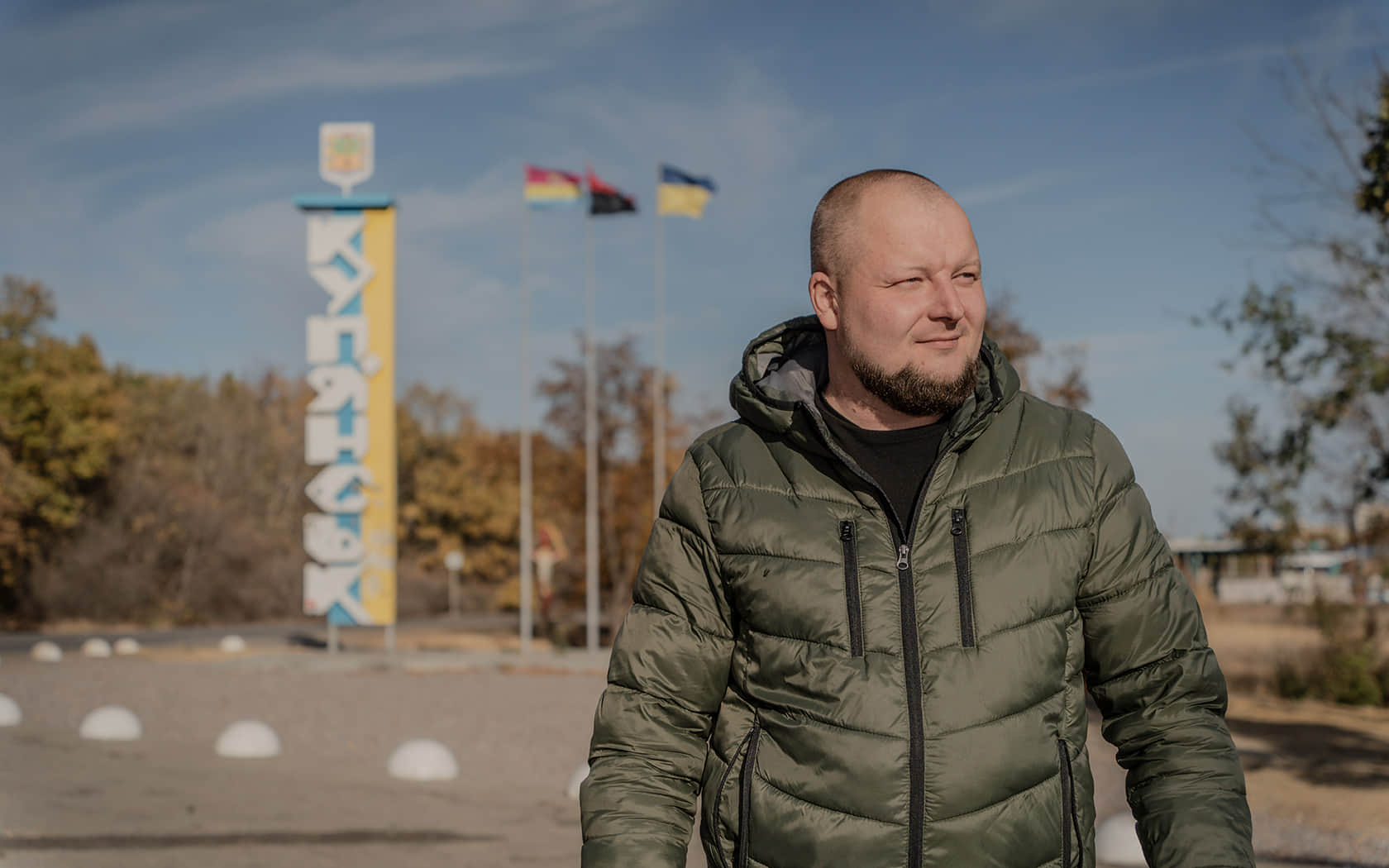 Volunteer Andrii VasianovychPhoto:Ivan Samoilov
Volunteer Andrii VasianovychPhoto:Ivan Samoilov
Since the beginning of October, local authorities report that over two thousand civilians have been evacuated from the Kupiansk hromada, particularly 1,700 from the left bank. As Andrii said, the highest daily number was 280 people.
"The more attacks intensify, the more people are choosing to leave," the volunteer explains. "For those refusing to go, it's usually because of their home. They only agree once their house is destroyed. People really don't want to leave; we see tears all the time.
Every day is different - it's impossible to plan what things will be like even 10-15 minutes ahead. So, each day is a quest - finding a way to evacuate people quickly and safely."
Advertisement:An oasis of life
The October sky over Kupiansk is completely clear today, not a cloud in sight. A small market on the edge of town looks like an oasis in the desert.
We order coffee at a stall bearing the existential motto "Everything is relative and absolute". Shortly after, an elderly woman enters. "Out for a walk?" asks Olha, the vendor, as she brews our Americanos.
"No, I need to buy something for the cats in the garages," replies Valentyna Vasylivna. "Not sure what to feed my own pets with, though. The food is so expensive. I always buy them the Pro Plan chicken - 1.5 kilos costs 600 hryvnias.
If it's the cheaper stuff, like 100 hryvnias, they just won't eat it."
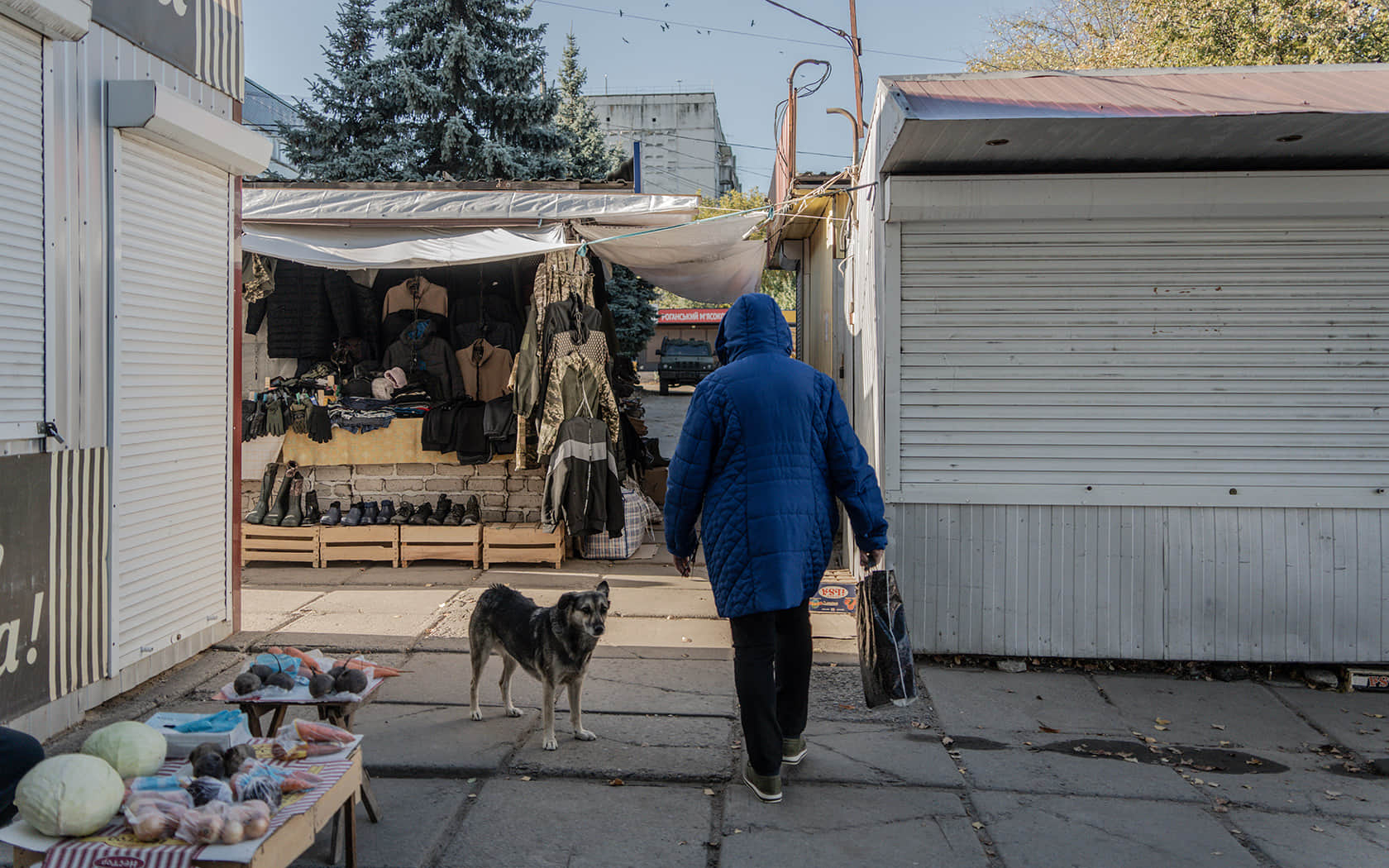 Market near the entrance to the cityPhoto:Ivan Samoilov
Market near the entrance to the cityPhoto:Ivan Samoilov
Valentyna Vasylivna is 76 years old. She was born in Sumy Oblast and has lived in Kupiansk for almost 30 years, having moved here from Kharkiv with her husband, a police colonel. "My husband's been in the cemetery for 24 years now," she says with a yawn. "And I'm scared to go there myself, it's been a long time.
My sister's in Cherkasy, my younger daughter's in Kharkiv. My eldest passed away, and my granddaughter is in Poland." Valentyna Vasylivna stayed here during the occupation and last visited Kharkiv in 2017.
She lives alone with her two cats, Sonia and Anfisa, whom her granddaughter brought to her before leaving. When asked about evacuation, both women smile.
"So, do they hand you the keys to a new flat right away?" Olha jokes, adding that she'll only part with her own keys if they offer her a place somewhere quiet. Valentyna Vasylivna isn't planning to leave just yet.
She says that, for now, utilities are still running in her home, and she can't bear the thought of leaving her cats behind. Although the strikes frighten her, especially at night, her suitcases are already packed. "No one wants to take me with my little cats - not my daughter, nor my sister," she laments. "What am I supposed to do with them?
I can't just abandon them. My granddaughter says, 'I'd take them to Poland,' but it would take ages to get their documents sorted."
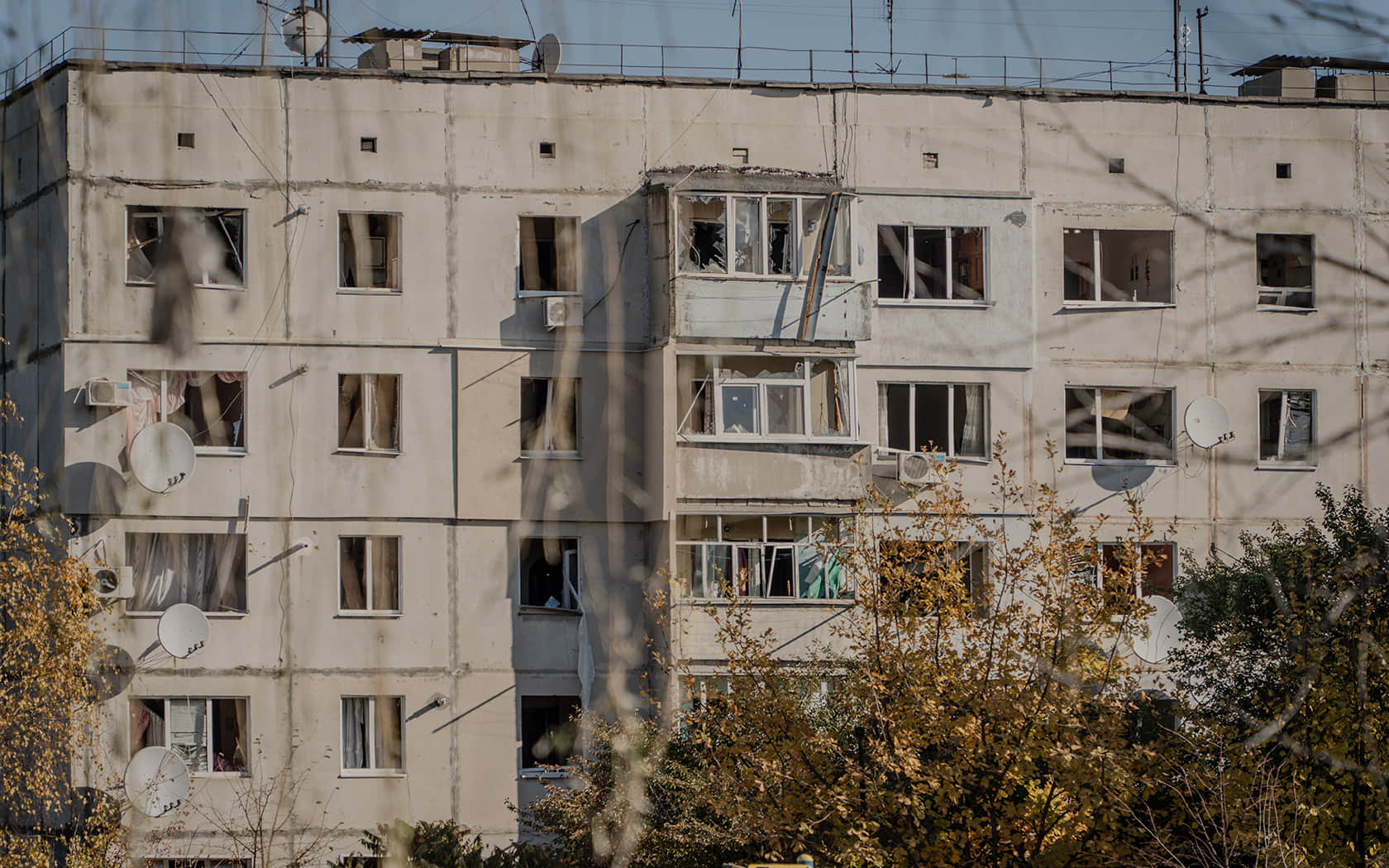 Most houses in Kupiansk damaged or destroyedPhoto:Ivan Samoilov
Most houses in Kupiansk damaged or destroyedPhoto:Ivan Samoilov
As we talk, muffled explosions echo from time to time. "I think it's our guys firing right now," the pensioner says. "I can already tell by the sound.
I keep hoping we'll make peace someday. How much longer can people keep dying?" Near another stall, an elderly woman calls us over.
Liudmyla was born in Kupiansk and has lived here her entire life, spending 15 years working at sea as a laundress and a cook. Nine days before the full-scale invasion, she returned from an overseas trip and fell ill. With the onset of the large-scale war, she began experiencing fainting spells.
After the city was occupied, she went to hospital, and from there, she was taken to the temporarily occupied territories. She spent a month and a half in a medical facility in Russian-occupied Luhansk. "They took me without any money.
I would stand outside the pharmacy and beg for money for tests," she recalls. "On 22 July, they removed my thyroid. I told them (at the hospital) that I was for Ukraine; we listened to Chervona Kalyna [Ukrainian patriotic march - ed.] - both Russians and Ukrainians - right in the ward."
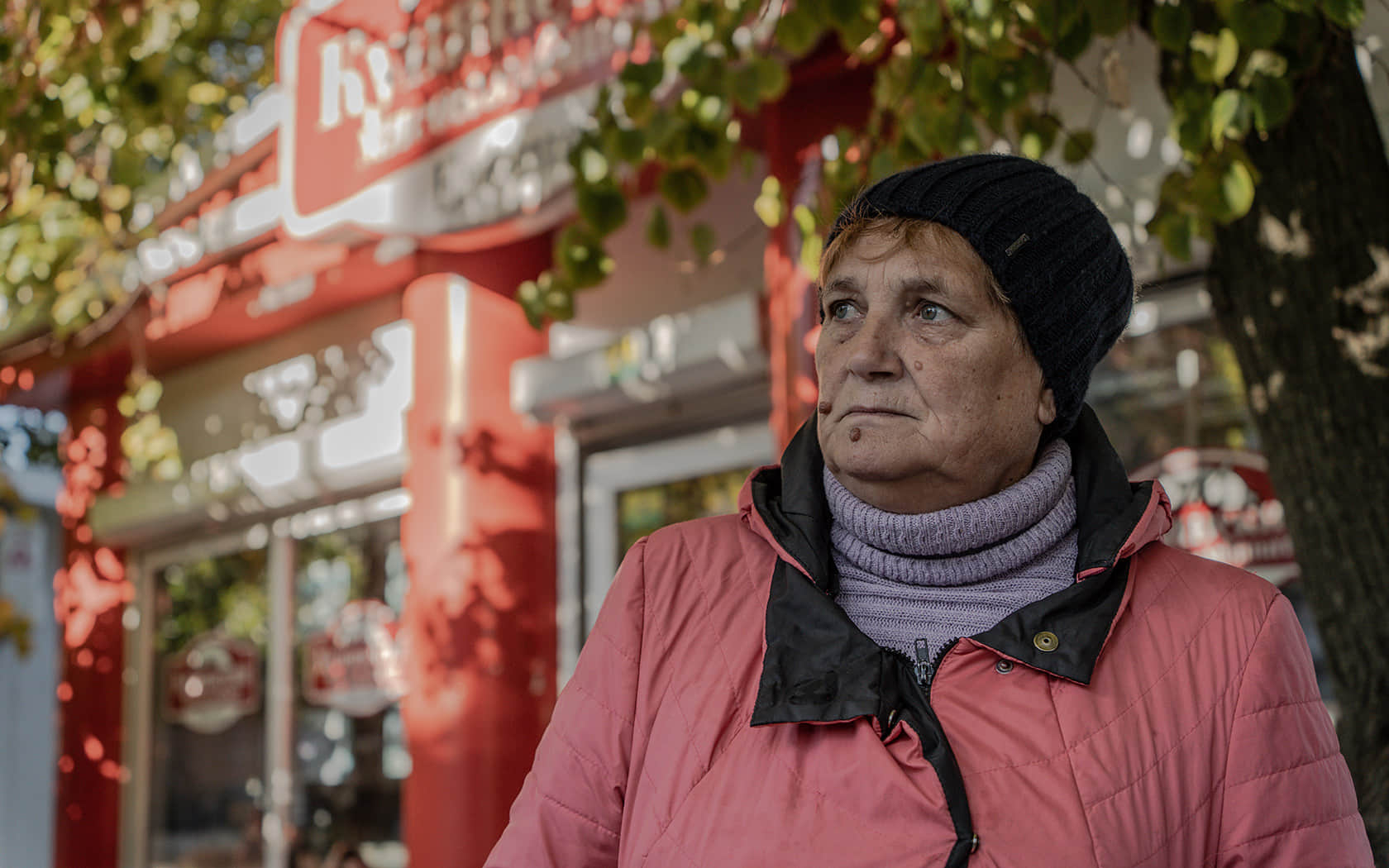 Liudmyla, a resident of KupianskPhoto:Ivan Samoilov
Liudmyla, a resident of KupianskPhoto:Ivan Samoilov
Ludmyla returned home before the de-occupation. The first thing she noticed in Kupiansk were the flags hung up by the Russians - "those pink rags from the so-called LPR [Luhansk People's Republic - ed.]".
But soon, the Kharkiv counteroffensive began. Ludmyla's family is currently in Poland. She lives alone with her dog and cat in Kupiansk.
The airstrikes, she says, are constant, but she doesn't want to go to Kharkiv either, "because it's just as dangerous there". "I won't stay if the city is occupied, but I don't want to leave my home. I've travelled so much in my life," she explains. "I've been to the Mediterranean, Canary Islands, Africa, and Uruguay.
Also the Pacific Ocean: evidence from space showed there was an accumulation of fish there, so we crossed all of the Atlantic and the Drake Passage." "I think we will win. Why do we need these Russians?
We've not invited them here. I've been to Russia and seen how they live. There was so much rubbish!
They say [the West] is 'rotten capitalism', but when I went abroad, I saw neat paths, cars, everything was clean and tidy. What can you learn from [the Russians]? They don't have a good life and they don't let us have one either."
Advertisement:We meet a good-natured woman at the far end of the market.
She has socks and other essentials laid out in front of her. "What would you like to buy from me?" Liubov smiles, adding that everyone there is careful, looking into people's faces to try and figure out who might be a saboteur. "If I stayed in all the time, I would lose my mind. This way we can talk.
People come over, ask questions. That's our lives."
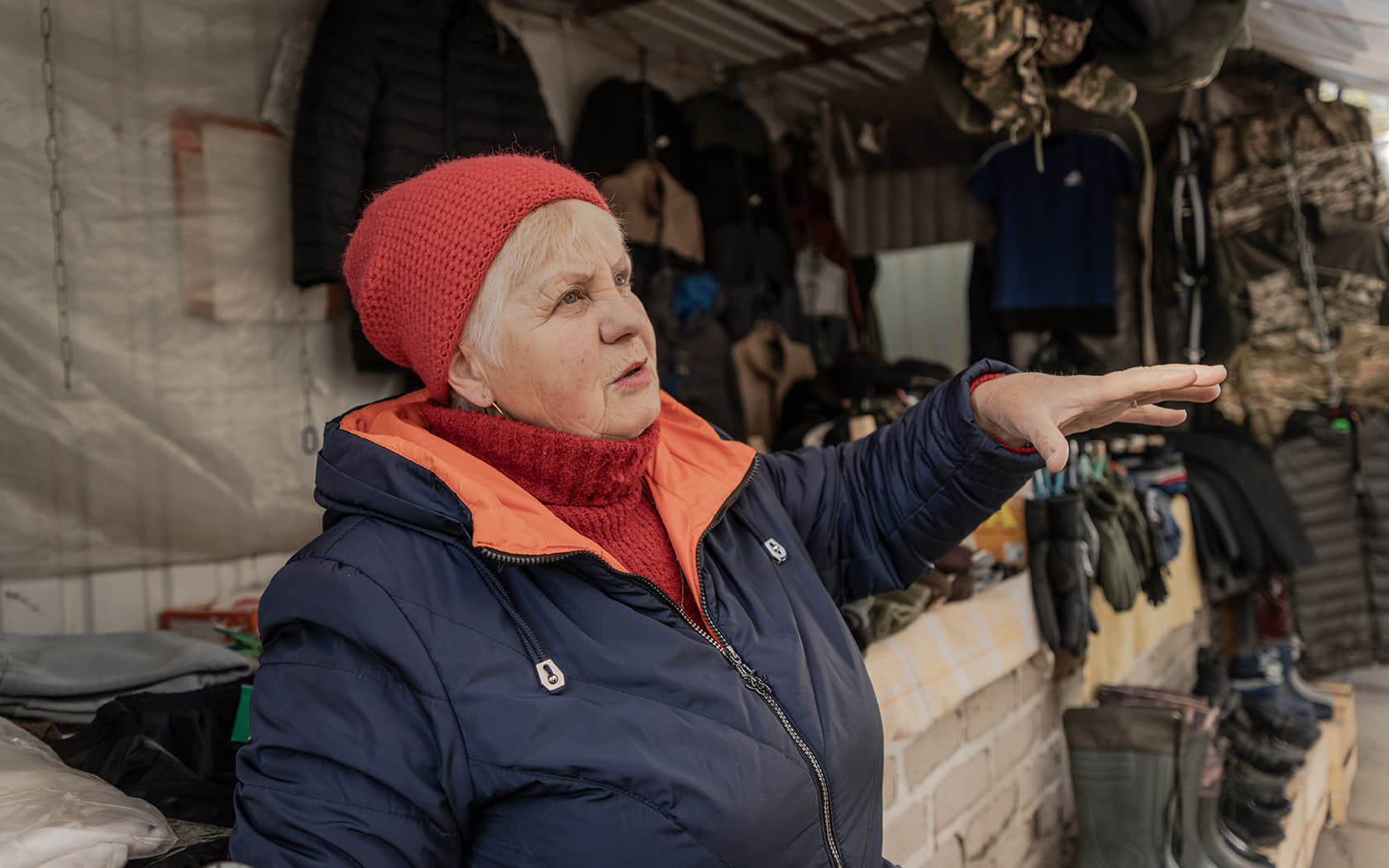 Liubov is a seller at a local marketPhoto:Ivan Samoilov
Liubov is a seller at a local marketPhoto:Ivan Samoilov
Liubov is also from Sumy Oblast. She came to the Kupiansk region in 1976 because of her husband, a lieutenant colonel in the reserve, who was assigned here.
She worked as a paramedic on the left bank of the Oskil River. Her husband died eight years ago. Liubov was in Kupiansk when it was occupied by the Russians.
She went to Petropavlivka, on the left bank, hoping to come back home after Kupiansk was liberated. "The Ukrainian Armed Forces were already entering [Kupiansk]. They - I wanted to say the Germans, but I mean the Russians - were fleeing in their tanks," Liubov recalls. "They didn't shoot at us because they thought we were also fleeing to Russia."
She says that the residents of Kupiansk had barely survived that first winter after the city was liberated: "We didn't have water or power for a month," she recalls. For now, all the utilities at her home are working. "The city is holding on for now, but [the Russians] keep drawing closer," Liubov says. "It's psychologically difficult to be here.
On the day of the Feast of the Epiphany in 2023, when three missiles targeted a school, it was horror... They don't care about civilians, they just mindlessly kill us."
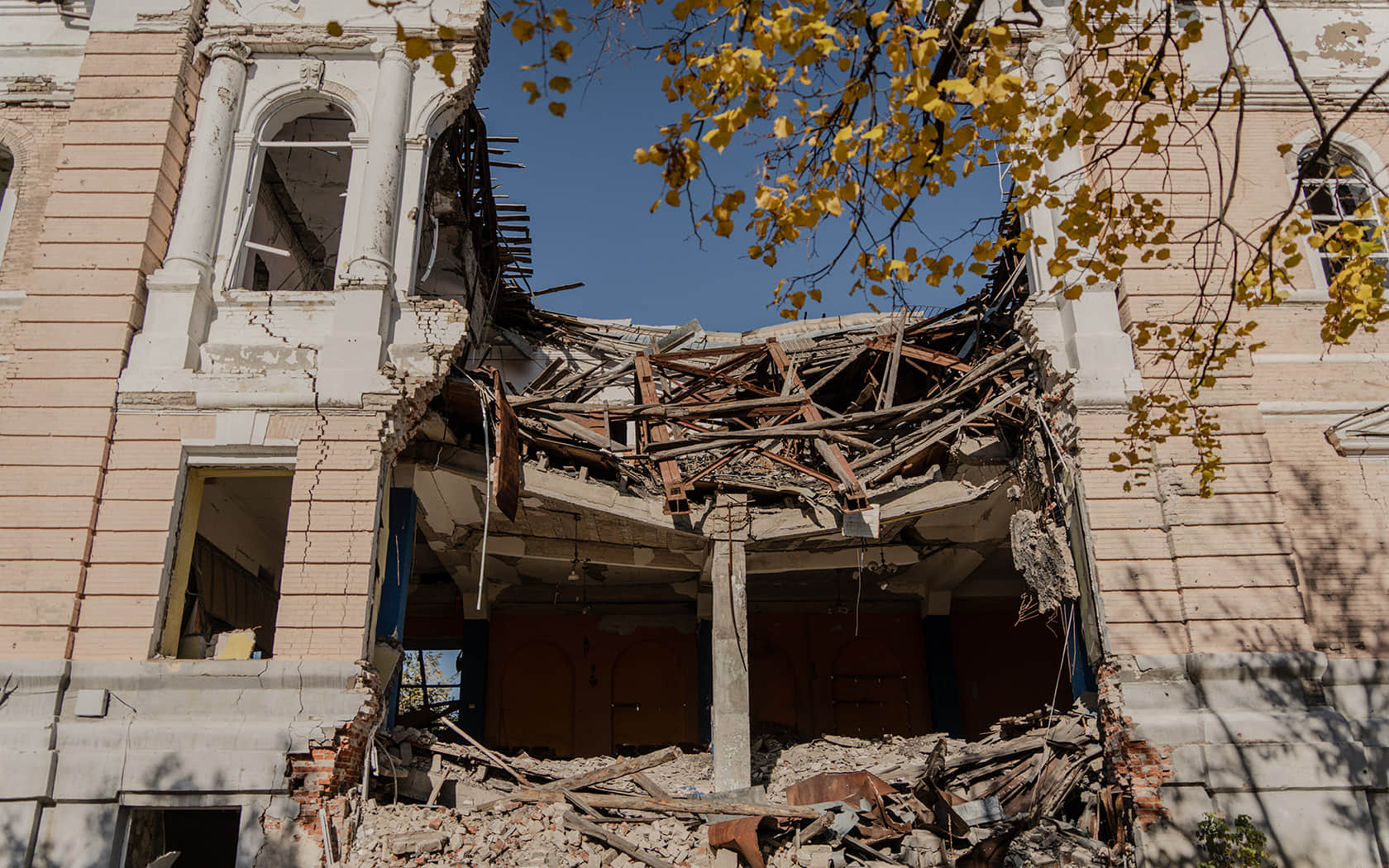 A historic building from the 19th-early 20th century, which housed the Kupiansk House of Culture (an arts and culture centre) in our timesPhoto:Ivan Samoilov
A historic building from the 19th-early 20th century, which housed the Kupiansk House of Culture (an arts and culture centre) in our timesPhoto:Ivan Samoilov
Liubov believes that resilience runs in Ukrainians' genes. She cites her family as an example.
They were considered intelligentsia in their village. "World War II was difficult for my parents," she says. "Mum had three kids. Two of the youngest ones died from hunger, they aged six months and a year and a half.
Germans took residence in one half of her house, and my mum lived in the other with her kids. Ability to survive is at our very core." Liubov says she is going to evacuate to her birthplace, the city of Lebedyn in Sumy Oblast, though she has made this decision with a heavy heart.
"I'm 71. You know what it's like, leaving your home behind... I heard that you're welcomed well at the temporary accommodation [for displaced people] in Kharkiv, that it's alright there.
Kharkiv is doing great. But Kyiv doesn't understand how dire our conditions are here." At the time, none of us knew that Liubov would find herself in Kharkiv mere hours later.
Advertisement:"Greetings!
Evacuation."
We exit the market and walk for about 200 metres, if that. Suddenly the earth starts quaking beneath our feet, and the air seems to quiver, too. Smoke starts to rise over residential buildings nearby.
Later we find out that the Russians had dropped an ODAB-1500 bomb on the area near the market. "The crossings were attacked in the morning, there are police officers there," Andrii says. "Now they hit here. The area right by the market was hit.
You were lucky. This is the largest market, it was always crowded. So that was to be expected."
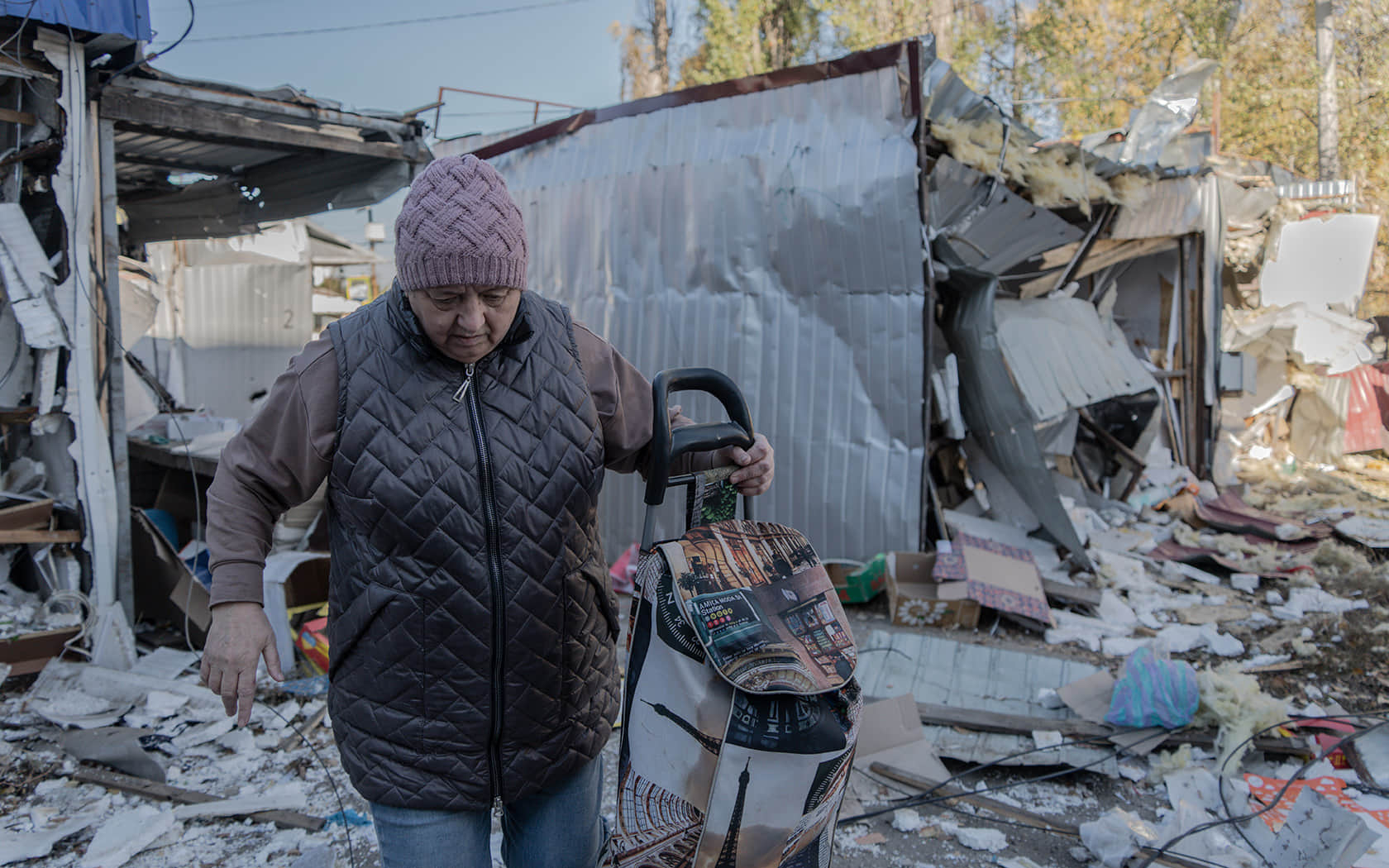 The aftermath of the attack near the Kupiansk market on 24 OctoberPhoto:Ivan Samoilov
The aftermath of the attack near the Kupiansk market on 24 OctoberPhoto:Ivan Samoilov
After catching our breath, we join volunteers in an ambulance headed to another district to help with evacuation.
We stop by an apartment block which had been damaged by an attack. Volunteers leave the car and lower the ramp. They knock hard on the doors and boarded-up window of a first-floor apartment.
A man on crutches comes out a moment later. "Greetings! Evacuation," the volunteers say. "You should've called ahead," the man rebukes them. "We couldn't reach you," the volunteers explain. "Get your things together." The man calls his mother, who lives nearby.
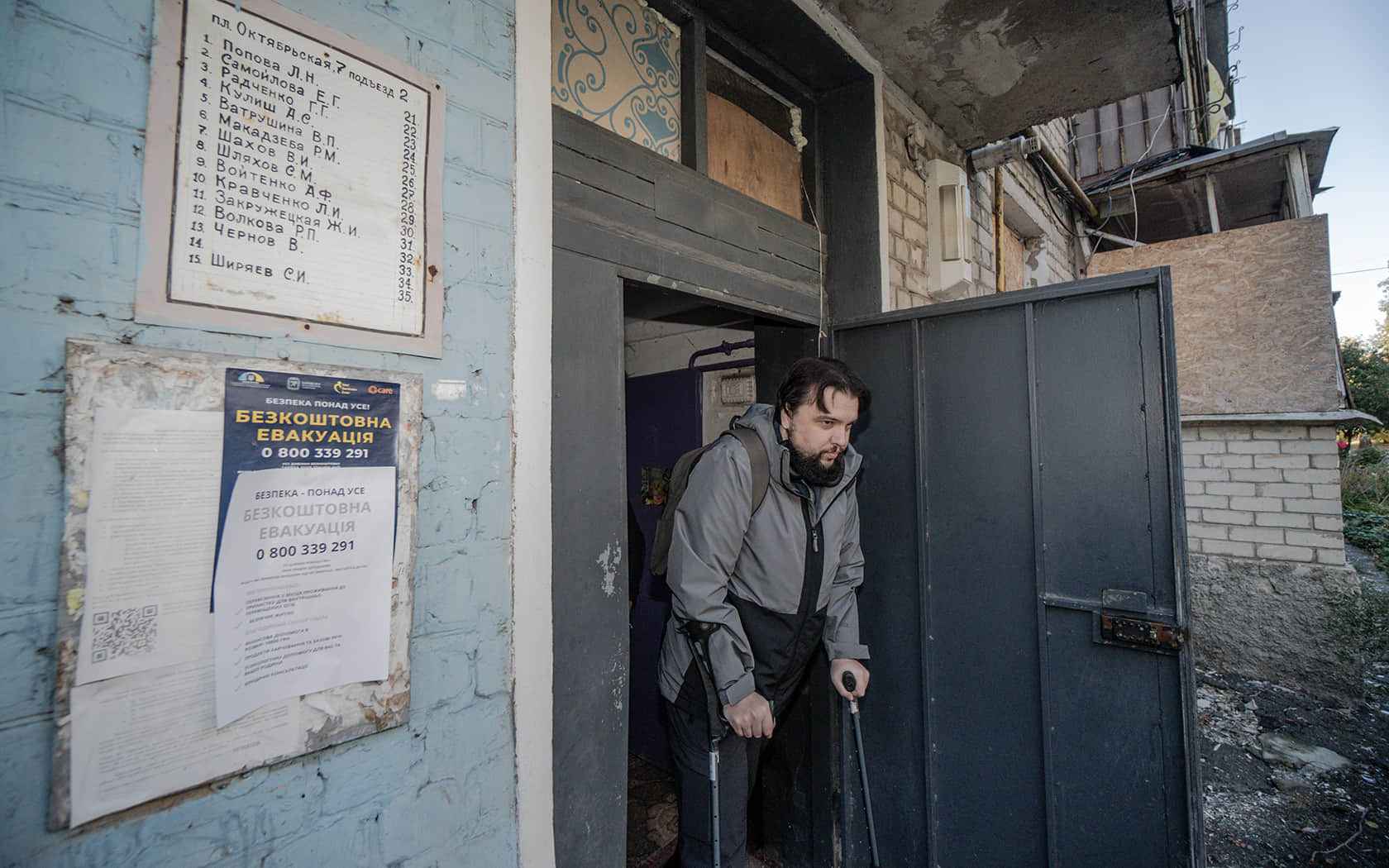 Yurii, a local residentPhoto:Ivan Samoilov
Yurii, a local residentPhoto:Ivan Samoilov
"Two people [are being evacuated] according to the request notice, one of them - Yurii, 38 - with limited mobility," the volunteers read.
They help him carry his belongings outside: a large travel backpack, a suitcase, a box with a monitor in it, and a plastic bag. Meanwhile, a song by the Russian band Agata Kristi, "Kak Na Voine" (Like At War), is blasting from a nearby apartment. All this is quite surreal, especially taking into account that Vadim Samoilov, one of the band's founding members, has been a vocal supporter of the war in Ukraine since 2014.
"F**k, I'm sick of these legs," Yurii says as he leaves his apartment and locks the door behind him. "So you can't sit for long stretches of time?" the volunteers ask him. "I've got Bilateral sacroiliitis," he replies. "I can't sit or stand for long stretches of time."
The volunteers help Yurii get into the ambulance and lie down on the stretchers. His mother appears soon after and also gets into the ambulance. Her home was also damaged in shelling.
YeVidnovlennia [eRestoration, an initiative to provide compensation to Ukrainians for housing destroyed or damaged by Russian forces - ed.], but they hadn't repaired her roof, because there was "no point". "There are constant explosions, we're always having cracks repaired in the corridor and bathroom," says Valentyna. "And the slate is cracking too." There is a list of the building's residents' names and surnames by the door to the apartment block.
Yurii is the last person left there. The building was hit on 1 October 2024, while he was at a hospital in Kharkiv; the Russians also nearly hit the hospital that day. But Yurii still returned home.
Gas and water were turned on in the building specifically for him following the attack. Yurii says he's used to shelling now. "I don't care at all," he smiles. "In September 2022, when Ukrainian forces reclaimed this area, we had no power, no water, and no gas - nothing - for a month.
We cooked food on the open fire. My mum can tell you: I was in her garden, we had a bonfire, I was making soup and something else, shells were flying over our heads."
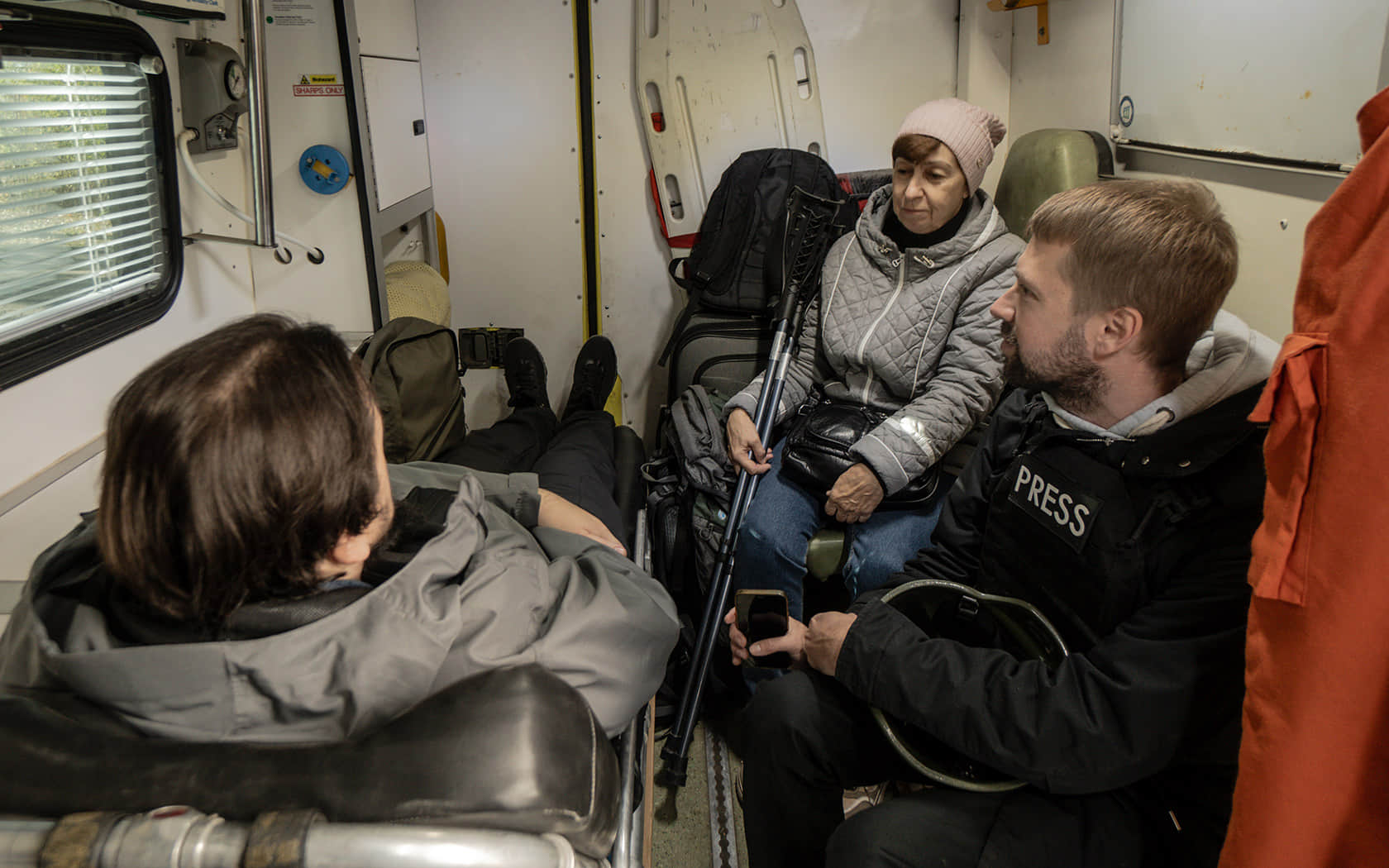 The road to the interim evacuation pointPhoto:Ivan Samoilov
The road to the interim evacuation pointPhoto:Ivan Samoilov
Yurii was born in Kupiansk. He worked at the water utility for over 10 years, "knee-deep in cold water in winter", which gave him a "whole host" of illnesses: bilateral sacroiliitis, arthritis of the knee joint, osteoporosis of both ankles.
Since 2017, he has had a group II disability. He stayed in Kupiansk throughout the occupation. "I would stay here for longer, but I need constant medical supervision, which is tough here," he says as we drive, as if making an excuse for his decision to evacuate. "But there are doctors working.
I completed a medical board assessment last week to confirm [my disability diagnosis]. Doctors are saying that it will keep getting worse over time." Yurii and his mother will stay with friends in Kharkiv for the time being, "and then we'll see," he says.
Valentyna hopes to go back to her native city eventually. Her husband is staying there. He says no one will get him out of there.
The rest of Yurii's family is currently in Germany. He could leave Ukraine and join them if he wanted, because of his disability, but that's currently not in his plans: "I don't want to go there at all."
Advertisement:Blood and emptiness
It's still impossible to travel across the Oskil River by car in Kupiansk and its vicinity. The destruction of the crossing has made it unfeasible for police and volunteers to respond to requests for help, many of which come from the left bank.
"I think this crossing is safer than others, but it's unsafe in that it's often being attacked," Andrii says. "It was destroyed five days ago, at night. It was fixed, and we were able to work during the day. The issue is being looked into right now.
They're looking for boats. Let's wait another hour." We scroll through the newsfeed on our phones while we wait.
Kharkiv Oblast Military Administration has reported another attack on Kupiansk: "A woman in serious condition was rescued from the rubble. Four people were injured in the airstrike. A two-storey shopping facility was damaged, 12 retail units were damaged, as were the windows in several non-residential buildings." The number of casualties would eventually rise to 10, and the woman, aged 73, would die in the hospital.
We return to the market an hour after the attack. There is a gaping hole in the building located just a dozen metres from the market, and there is debris everywhere. Police officers have surrounded the sight of the attack.
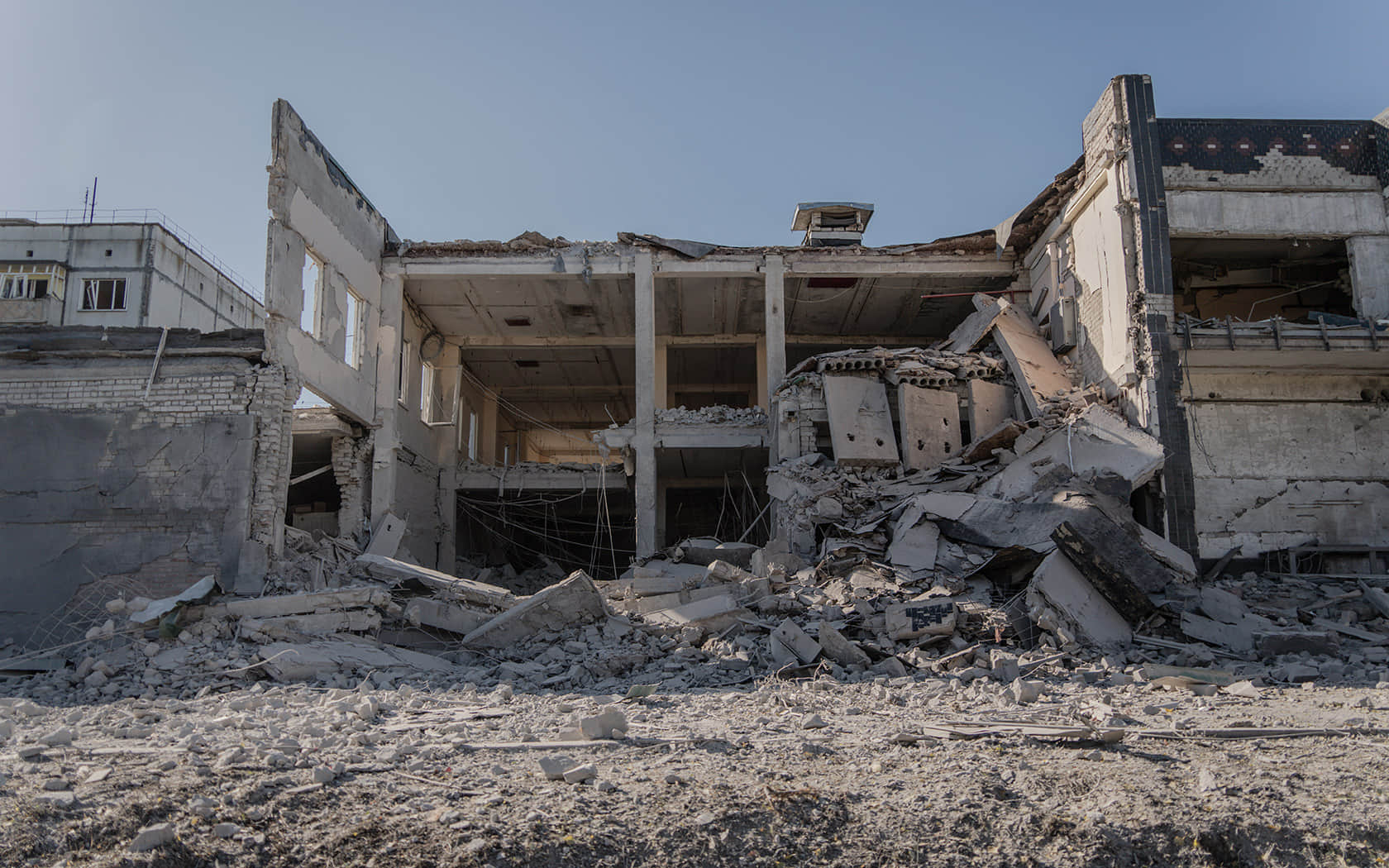 The building that the Russians struck with a one-and-a-half-tonne bombPhoto:Ivan Samoilov
The building that the Russians struck with a one-and-a-half-tonne bombPhoto:Ivan Samoilov
Points of sale in the market where life was bustling an hour ago look shattered and mangled.
Vendors are raking up shards of glass and trying to rescue goods from under the rubble. They are irritated by the presence of journalists: they say that where we are, there are "hits". The counter where Liubov's goods were lying is empty.
There are traces of blood nearby. "I know Liuba," the man who is clearing the rubble nods to our question, "Blood was running down her face. I called an ambulance, and it arrived.
I don't know what happened to her after that. Olia was also taken away in an ambulance."
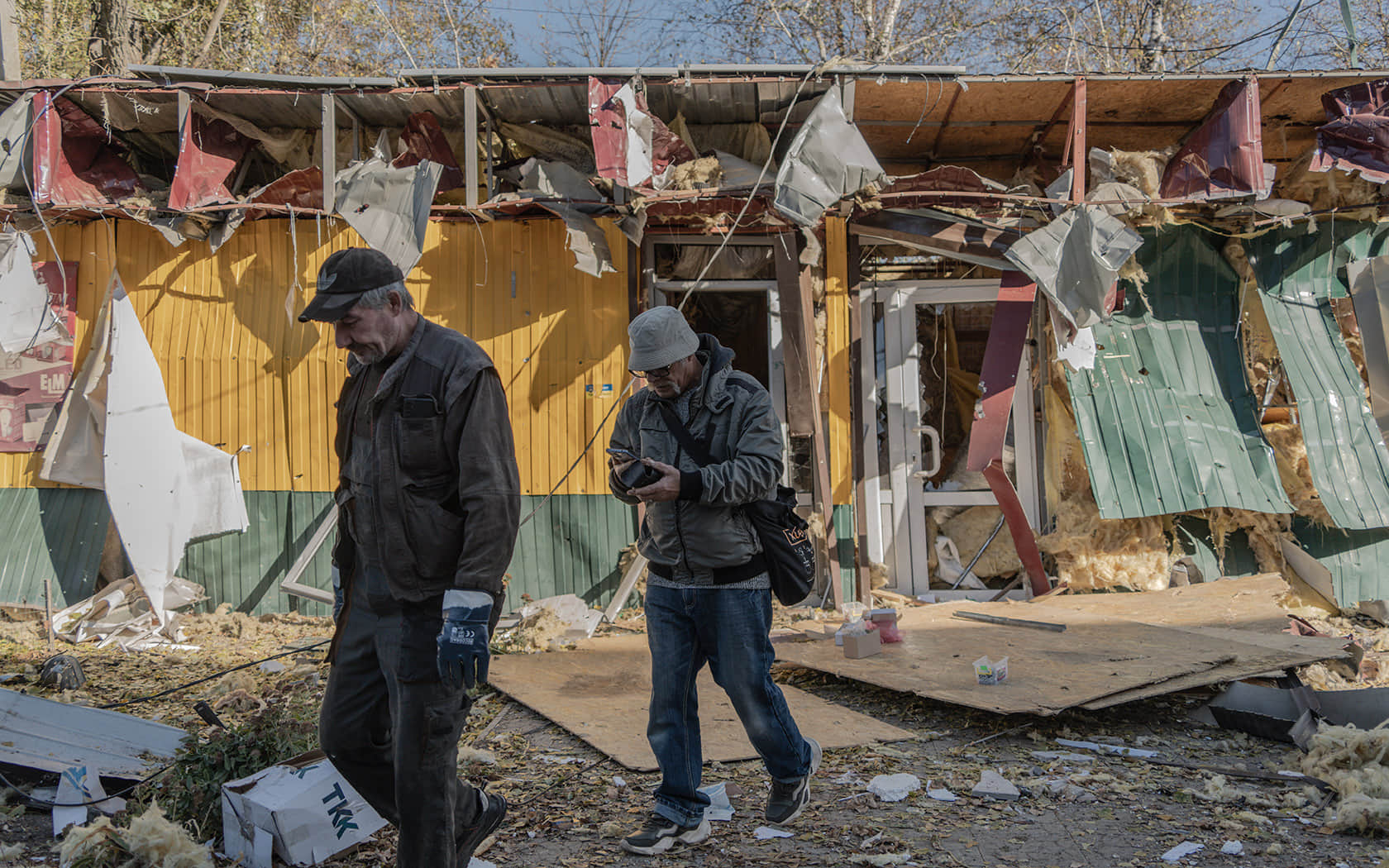 A photo taken an hour after the strike near the marketPhoto:Ivan Samoilov
A photo taken an hour after the strike near the marketPhoto:Ivan Samoilov
We return to the interim evacuation point. We ask a volunteer for a lift to the centre.
On the way, we see through the window the city that seems to have been sucked dry of all life. We stop in front of the local history museum - on 25 April 2023, a Russian missile hit it and killed two employees.
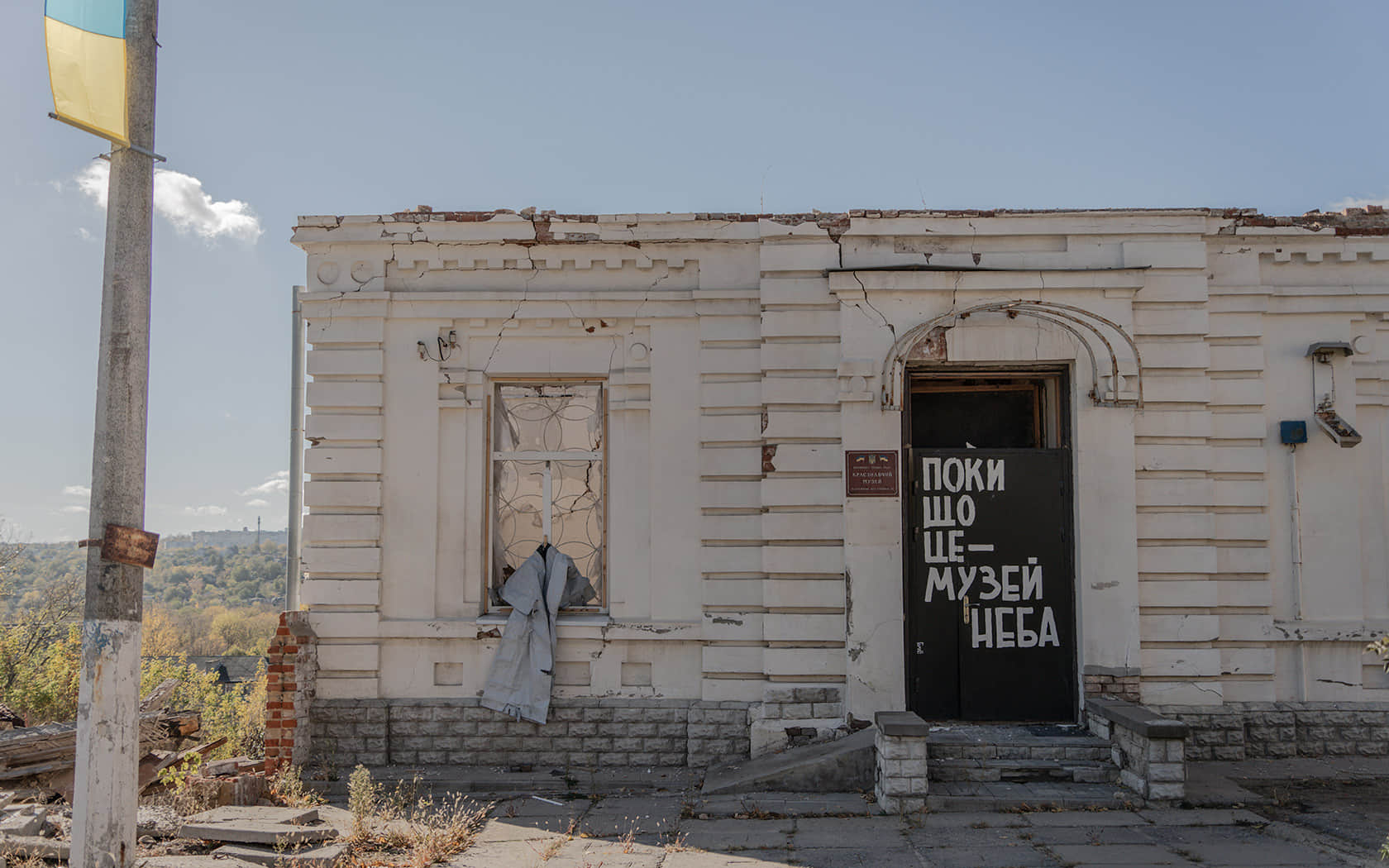 Ruins of the local history museumPhoto:Ivan Samoilov
Ruins of the local history museumPhoto:Ivan Samoilov
Last year, the ruins of a historic building were nearby - now they are gone. Instead, a concrete shelter was built, with minimalism inside--a kind of Kupiansk hygge.
However, it seems that no one has ever used it. Although there hasn't been any more destruction in Kupiansk over the past year, it feels like everything has changed dramatically. Not so long ago, a coffee shop of the Kharkiv-based Makers chain was still operating here, and humanitarian aid was distributed nearby.
Now, none of this is here anymore. The streets are deserted and uneasy.
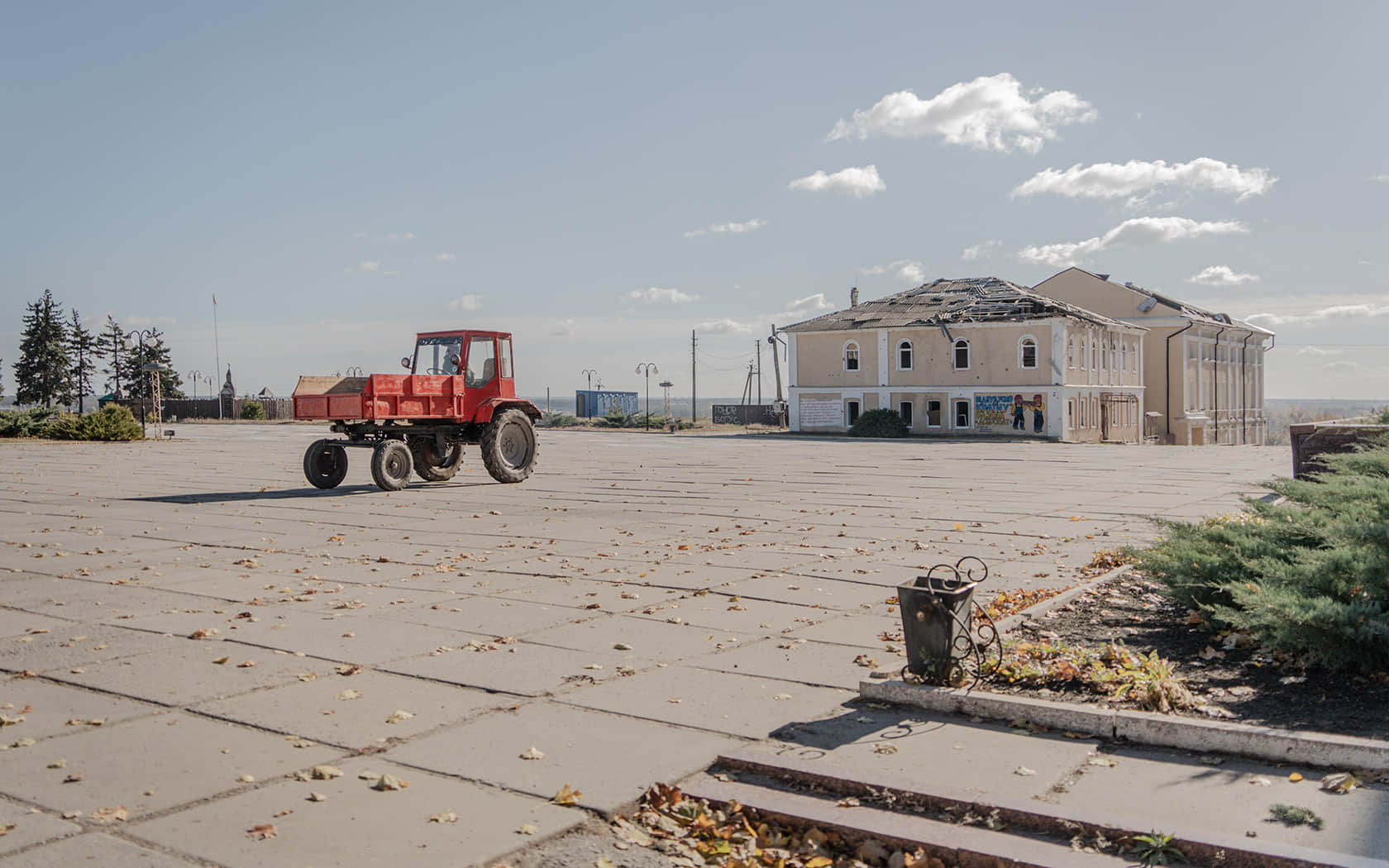 The central square of the cityPhoto:Ivan Samoilov
The central square of the cityPhoto:Ivan Samoilov
However, the local administration says that here, on the right bank, the situation is "difficult but under control", as critical infrastructure is working; hospitals, shops, ATMs and the Ukrainian national postal service Ukrposhta are also operating, and electricity and gas are available. The bombardments have caused problems with the water supply, but they are expected to be fixed by the end of the week.
Instead, the left-bank of the Kupiansk hromada is a living hell. "On the left bank of the hromada, there is no critical infrastructure, electricity, water, gas, mobile communications, social infrastructure," Andrii Besedin, Head of Kupiansk City Military Administration, told UP. "Hospitals, pharmacies and Ukrposhta are not working, and utilities are unable to function due to critical damage and bombardments."
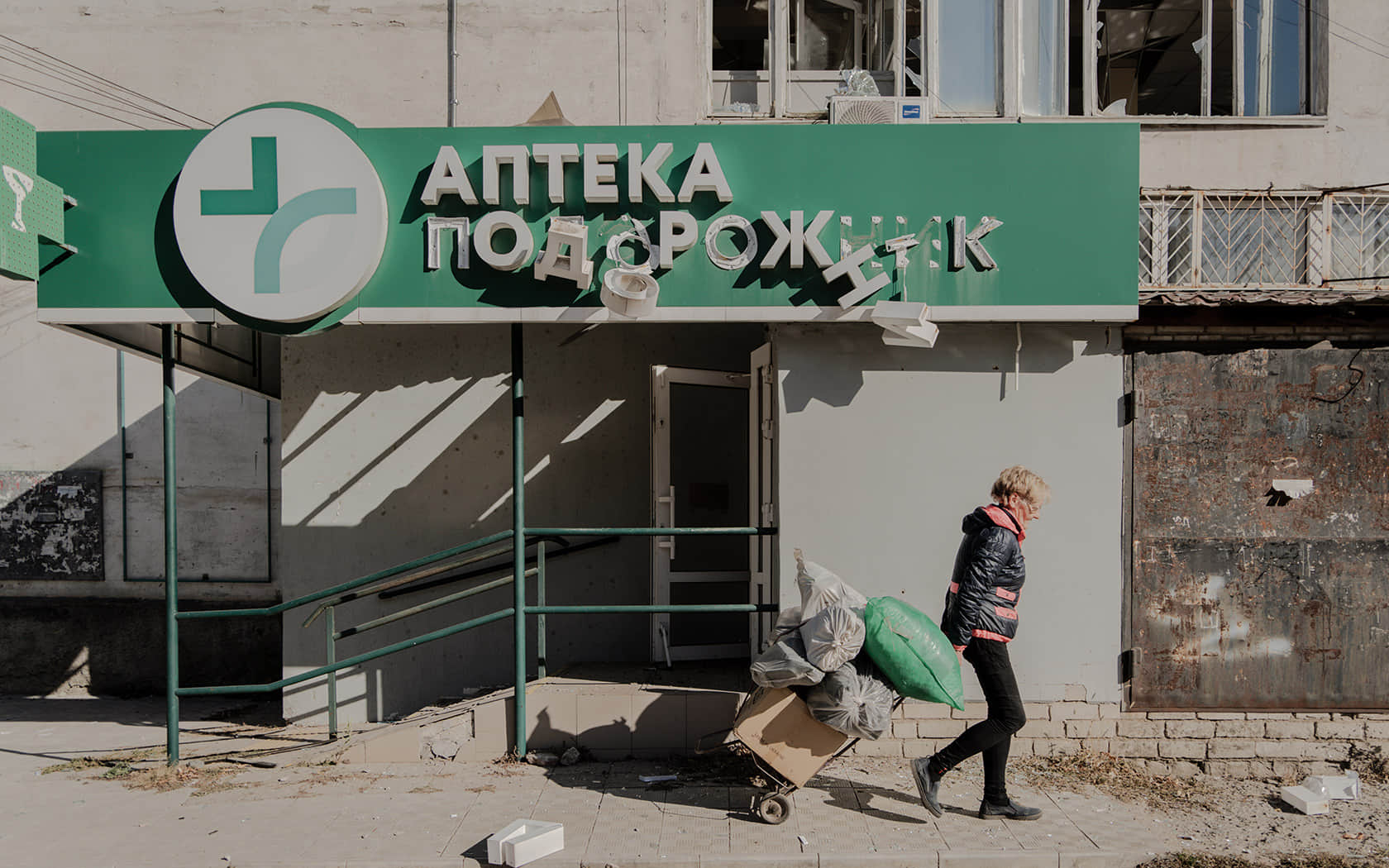 A pharmacy near the market damaged by the blast wavePhoto:Ivan Samoilov
A pharmacy near the market damaged by the blast wavePhoto:Ivan Samoilov
For the sake of at least vague safety, it is better to move around the city under the trees. But soon, the leaves will fall off, and it will be even harder to hide from the drones.
As we walk away from the central square, where there is not a single person, a military vehicle stops nearby. A soldier looks out of the window: "Guys, be careful, there are FPVs [drones]!"
"In my old age, I packed my things and left."
As soon as we return to the interim evacuation point, a woman is brought in from a village on the left bank of the Oskil River. She introduces herself as Oleksiivna.
This person's entire life is packed into three bundles. She says that out of 73 houses in the village, "maybe a dozen are still inhabited". "From September 2022 to May 2023, we were without electricity, but then they gave it to us.
And now they announced that they have cut off the electricity supply and will not give it to us anymore," she says. "Thank God I have a stove. My husband has been gone for six years. I can't even go to the cemetery to visit him; we are not allowed there.
There are no shops. At least there used to be a bus, so we could go [to the neighbouring village for groceries]. Now there is nothing - no electricity, no gas, no bus."
In the spring, a blast wave smashed the glass in seven windows in Oleksiivna's house. They were covered with cellophane. "It's good that I have firewood, but it's not enough for the winter," she complains. "It's cold, I can't prepare food.
So, I have to run away. I didn't want to leave until recently. But I can't take it anymore."
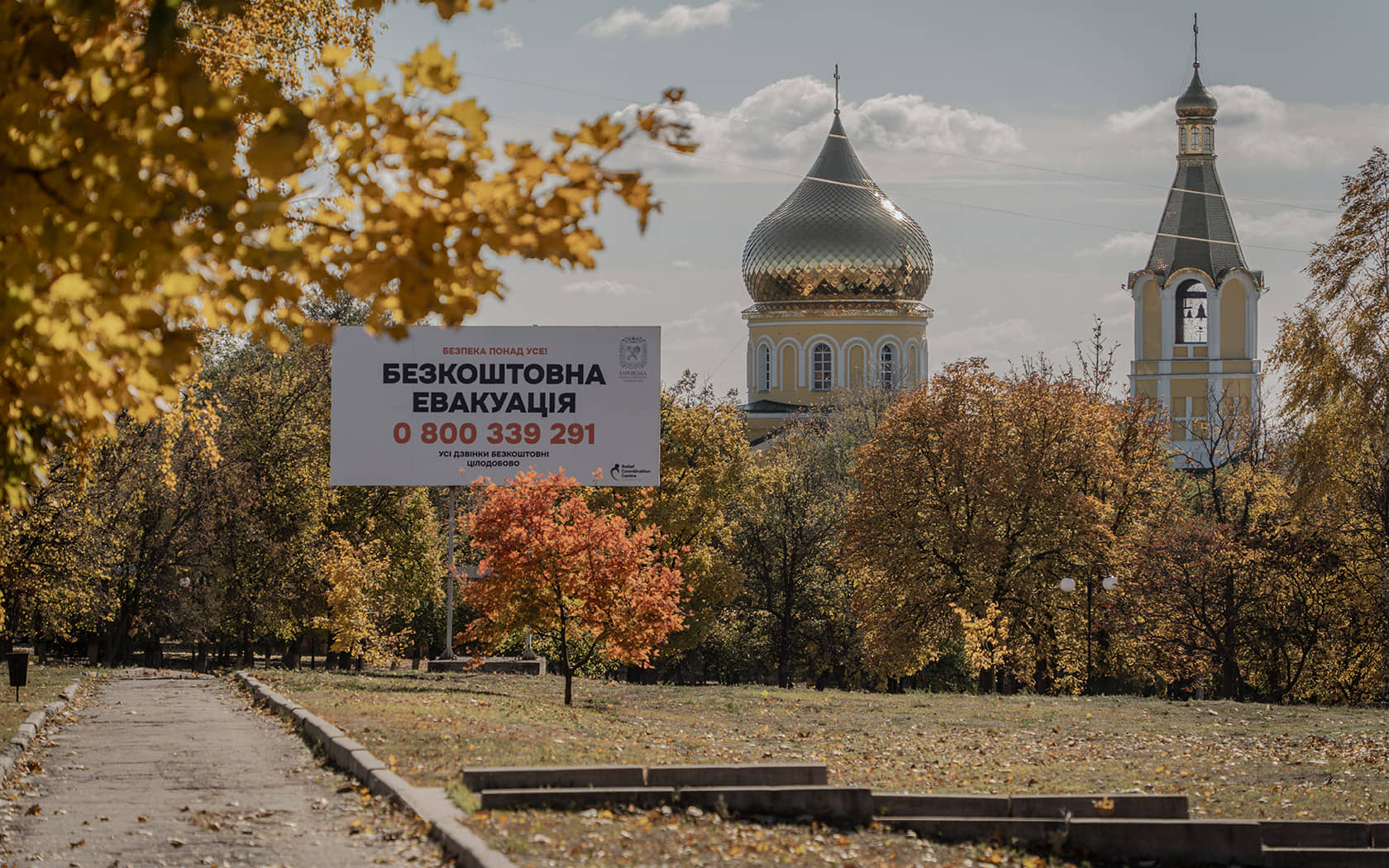 As the golden autumn continues in Kupiansk, the Russians are approachingPhoto:Ivan Samoilov
As the golden autumn continues in Kupiansk, the Russians are approachingPhoto:Ivan Samoilov
The day before yesterday, Oleksiivna left an application for evacuation.
She says she waited all day yesterday and half a day today. "It was a terrible night because they [the Russians] are firing," she sighs. "I was sitting on a bench outside the garden today, and we heard [the drone] humming, then it stopped somewhere. We were scared: "It's going to drop something." On Monday, I was walking and then, suddenly, there was an explosion.
The military quickly went to the shelter. They said: "Aren't you afraid?". I said: "Yes, I am.
But I'm going."" Oleksiivna had to cross the Oskil River on foot because of the destroyed car crossing. The police took her from her home and brought her there.
On the right bank, a patrol was waiting to transport her to the volunteers. "I can barely walk; my heart is not good," she complains. "We had a bridge, it was broken. I said: "Guys, I'm afraid of heights!".
And they said: "We'll help you to cross it." They took me by the hand and helped me to cross with my kravchuchka [hand trolley]." Oleksiivna does not have a place to live in Kharkiv, "I have never in my life lived in a dormitory". She worked at a factory for many years but has a pension of only 3,050 hryvnias (US£75).
"Some are leaving, some don't want to leave everything behind, but I don't care anymore. I don't have what I used to have," she says, and immediately admits that she still doesn't want to leave. "I would stay here - I don't know what I would be waiting for. I'll be 71 in November; I've lived there all my life.
And now, in my old age, I'm packing my things and leaving." "It's better to leave but stay alive, and the house won't save you from a missile," warns Andrii. "I know," Oleksiivna replies, "I saw and heard it."
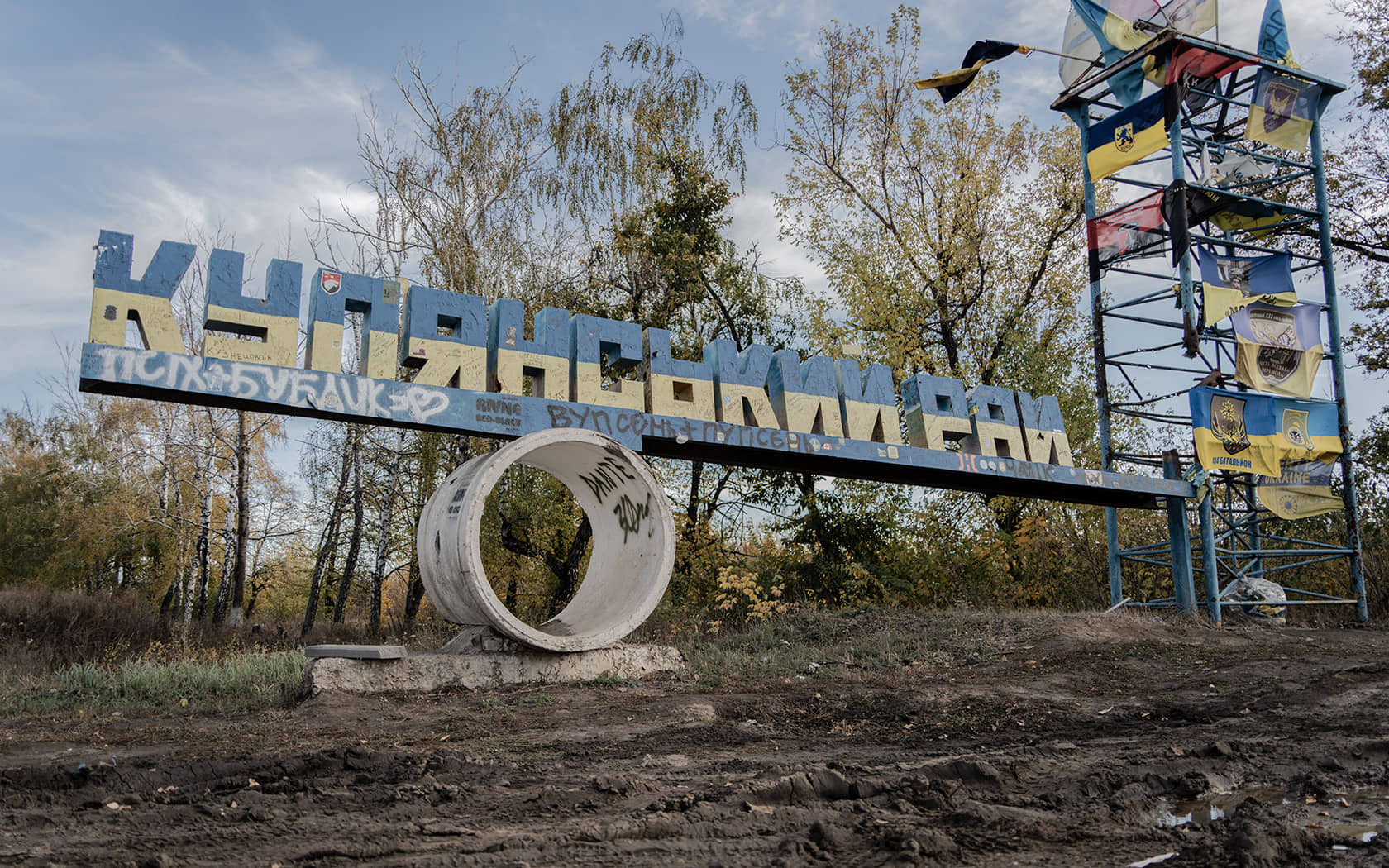 The sign at the entrance to Kupiansk district is full of bitter irony [Some letters from the word "raion" have fallen and the remaining part became "rai", which means "heaven"]Photo:Ivan Samoilov
The sign at the entrance to Kupiansk district is full of bitter irony [Some letters from the word "raion" have fallen and the remaining part became "rai", which means "heaven"]Photo:Ivan Samoilov
"Stitched up, head injury"
Further waiting proves to be in vain - the road crossing through the Oskil River is not being restored.
In two hours, at 17:00, a curfew will begin in Kupiansk. "Let's take off and go to Kharkiv," Andrii says into the phone. Because of the destroyed crossing, only nine of the 36 people who were supposed to be evacuated were able to do so today.
Only Oleksiivna was evacuated from the left bank. Today, Andrii says, only the police and the State Emergency Service were working there - it is better to go to the local villages in armoured transport or with EW protection. "There are many people left on the left bank in danger," the volunteer emphasises. "As soon as we are given the opportunity to pick them up, we will try to get them out. "
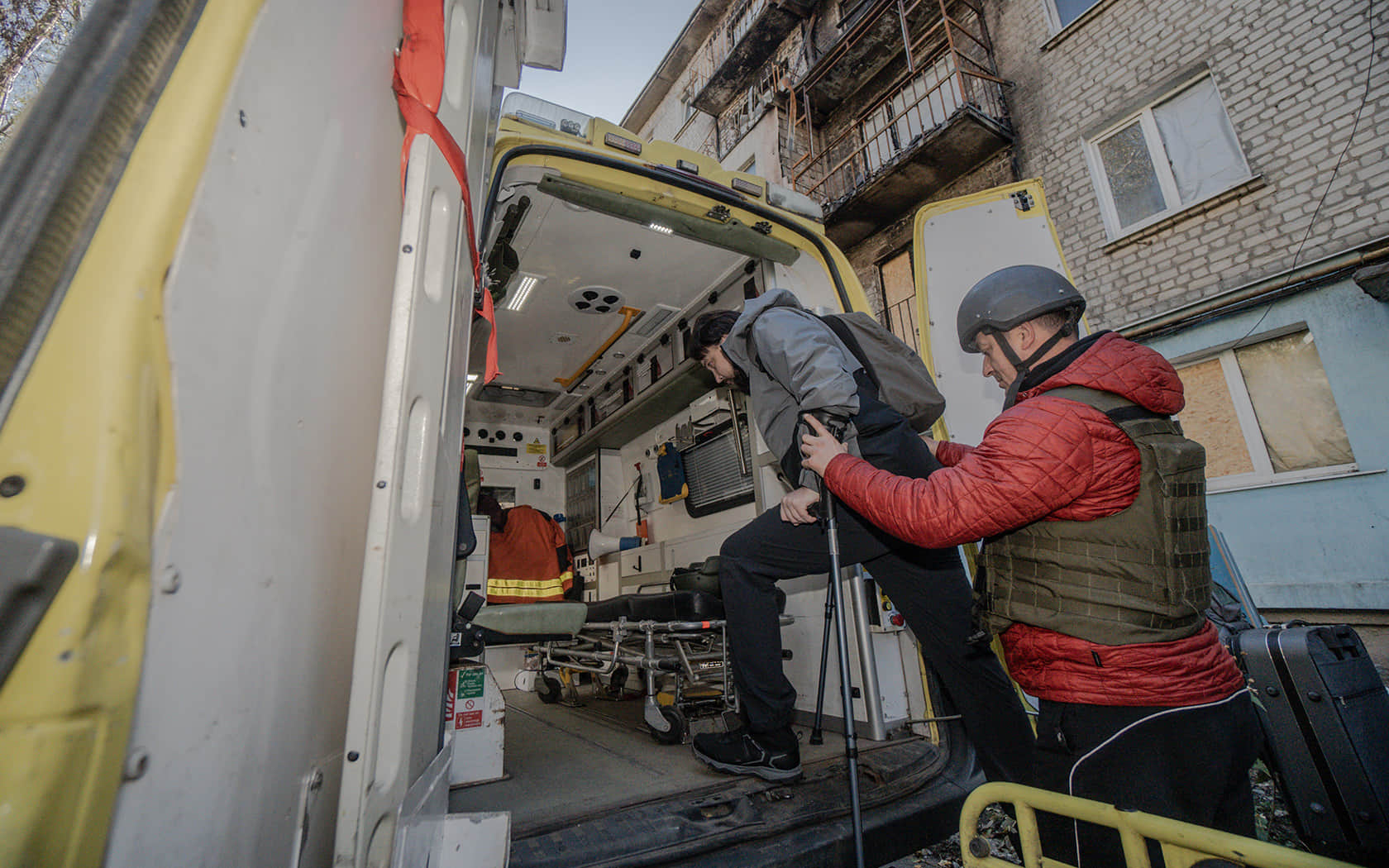 Tomorrow, the volunteers will return for the people who could not be evacuated todayPhoto:Ivan Samoilov
Tomorrow, the volunteers will return for the people who could not be evacuated todayPhoto:Ivan Samoilov
We return to Kharkiv and park near a transit point on the outskirts of the city.
Here, people who have been evacuated are registered and provided with assistance from various funds. Then, if they have a place to live, they are taken further around the city and Ukraine; if not, they are placed in dormitories. In May, when the Russians opened a new front in Kharkiv Oblast, Andrii recalls, there were crowds.
But now, there is no rush. And those who were evacuated from Kupiansk today have already been taken further. We set off as well.
Andrii drops us off at the metro station. As soon as we get out of the car, Liubov calls us. "I'm in Kharkiv, at the oblast hospital," says a quiet voice on the other end of the line." An ambulance took me from the battlefield right away.
They stitched me up; I had a head injury. I am now on a drip." When we ask how we can help, the woman asks us to bring her a bottle of water and hygiene products - she was hospitalised with nothing.
We buy some food and go to the hospital. We enter the ward where three women are lying. It took us a while to recognise one of them - with her head bandaged - as our heroine.
The woman asks us not to switch on the light and complains of a headache. "There was a sudden strike. I saw how it flew," says Liubov. "Everyone there was injured.
If I had been a little closer, it would have been over." A few days later, during our conversation, Liubov's voice on the phone sounds sad but more cheerful. She should be discharged from the hospital by mid-November.
Dmytro Kuzubov, photos by Ivan Samoilov
Translation: Anastasiia Yankina, Olya Loza, Yelyzaveta Khodatska
Editing: Gabriel Neder, Susan McDonald